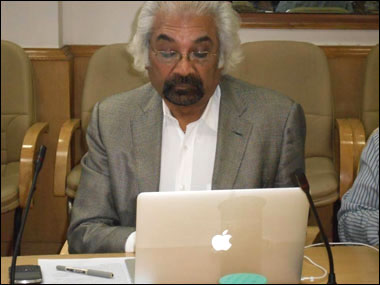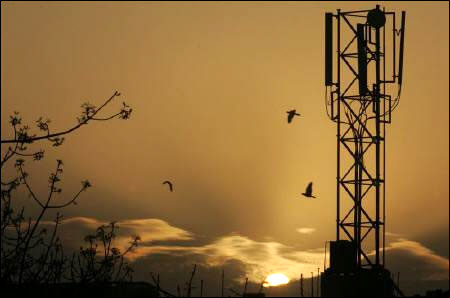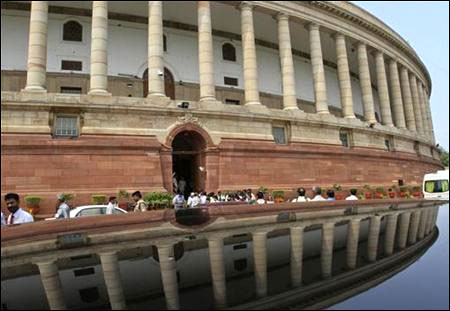 | « Back to article | Print this article |
Sam Pitroda on public information infrastructure & innovations
Sam Pitroda is used to wearing many hats. At present, he is advisor to the prime minister on public information infrastructure and innovations. What has also caught his fancy is the increasing connectivity among citizens,transcending boundaries. Pitroda and Hubert Vedrine, former foreign minister of France, have founded the People for Global Transformation (PGT). Along with Reliance Foundation, PGT held its first meeting with 10 members in Mumbai last week. In a chat with Shivani Shinde, he spoke about this initiative, how the internet was changing the world and why it took time in India to implement policy changes. Excerpts:
What is the idea behind PGT?
The idea behind it has been in my mind for three to four years. Three years ago,I met Hubert in Paris and we talked about global issues. The world has changed substantially, but this change has not been noticed. It's time to revisit the global scene, to see if there are lessons to learn from what has happened in the past decade or so, and come together to think about what kind of world we need to create.
For over a decade, I have been telling friends that during the World War II, small groups of people got together and decided certain institutes needed to be set up and they were formed with an idea to dominate the world. So, we have the UN, World Bank, NATO and others. All these institutions do not make any sense now; they are obsolete.
I think there is a bigger war taking place, with the internet at its centre, and which has bigger implications than World War II. If the internet has bigger implications in terms of change, then are we ready to set up institutions for the next generations? The idea behind this group is to look into such issues.
This group of 10 people primarily comes from a policy-making background, from emerging and mature economies. We know it's a tall order but someone has to do it.
Sam Pitroda on public information infrastructure & innovations
For this to have an impact, you will require political will as well.
This itself is an old way of thinking. Nation-states might not have the same meaning anymore as 70 years ago, especially in the connected world. You can start a movement by sitting in a corner in Mumbai, which will have support from various regions of the globe.
The power of connectivity and the internet and what we have accomplished in the last few years have been phenomenal. We want to discuss such questions; it is time to raise these. Perhaps in the next four-five years, we might have some answers or solutions.
You recently held a press conference on Twitter. Why?
The idea, again, was to do something different. Nobody has done this before. The Indian media has a tendency to lapse into the past. Many complained I was not answering hard questions. The idea was not to answer these questions but to have a focus on the topic that was disclosed.
Don't ask me questions that are not related to the topic; I will not answer these. The idea was to reach out to the voices on the ground, which I cannot do in a traditional press conference. In Twitter, two things are unique. One, it has the ability to reach out to a large number of people. Two, your message has to be crisp and clear.
We have learnt lessons from this as well. Like, we received 700 questions, but only 50 were answered, so we need to keep the duration of the conference longer. We should give the videos a day in advance rather than a few minutes before.
We need to be focused and crisp and we need to time it better for larger global participation.
Click on NEXT for more...
Sam Pitroda on public information infrastructure & innovations
The topic, 'Democratisation of information' was a bit ironic when the government was trying to control it.
I guarantee this will happen in India; it is just a matter of time. WikiLeaks is a classic example. But the point is, you have to be careful with information. Information technology is all about being sincere, honest and transparent.
I go back to Gandhi's philosophy - public standards and personal standards need to be same. The problem starts when you have two standards.
We all will have to learn that information brings with it openness, accessibility, democratisation, and decentralisation.
Do you feel the Government of India has a knee-jerk reaction when dealing with issues like social media and Internet?
In general, people are afraid of change, media or no media. People are concerned about change and they react to it. But this is inevitable. I have seen change in the last 70 years that I thought would never happen in my lifetime.
Sam Pitroda on public information infrastructure & innovations
When I entered the telecom space in the early 80s, we had two million telephones for 750 million people. It used to take 10 years to get a telephone connection. In 20-25 years, we have 900 million phones, we are a nation of a connected billion.
Never has this happened in the history of India. I think after the invention of language that united us, now it is the Internet.
The key question is, what do we do next? This is where the next generation of technology and products will come. The first phase was about connectivity. In the bargain, we lost base in manufacturing, broadband penetration is low etc. We need to fix it and the next five-six years should be used to fix these problems.
You have chaired several policy missions but many have not seen the light of the day. Does it not fluster you?
No, I think a lot of things have happened. The National Knowledge Network was a recommendation of the NKC (National Knowledge Commission). It is already operational. It is a huge accomplishment for India, but we still do not know how to use it.
There was a recommendation on libraries; we have a library commission. We have a commission on translation. But people are only hung-up on higher education and that has not yet happened.
A lot of things have happened, some faster than others, a lot needs to be done. But, then, this is how our government works. I do not get flustered, simply because we are building a nation and not a company.
Click on NEXT for more...
Sam Pitroda on public information infrastructure & innovations
But every project needs a pace to be maintained.
It's okay. If one does not work, there is something else that will get activated. In life, you have to do the right things, rather than doing things right. I am focused on doing right things. So you try, some do not start, some work fine.
It is a generational task and needs a different mindset. You keep doing in good faith and continue to be loyal, sincere, and committed. There are eight Bills pending in Parliament. If the Parliament works, these Bills are passed, you will see change. If they don't, then we will not see any action.
What are the three challenges in India that need to be addressed on a priority, to see a transformative change?
The three fundamental challenges are disparity, exploding demography and development. By disparity, I mean the widening gap between rich and poor, educated-uneducated and urban-rural.Our demography has 500 million young people below the age of 25; what are we going to do about them? Their jobs, training, education, etc - we have to think about their prosperity.
The third is development. Everything in India is happening at a slow pace. We need more hospitals, roads, doctors, schools and other things.
Click on NEXT for more...





